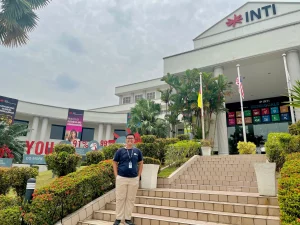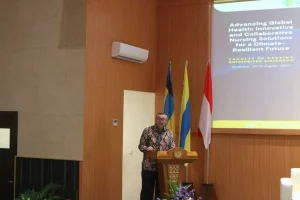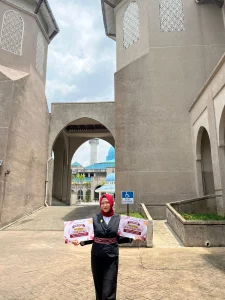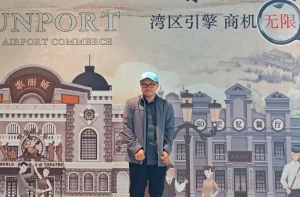UNAIR NEWS – As a democratic country, Indonesia has embraced a government system upholding the unair.ac.id people’s sovereignty. As a legal state, Indonesia guarantees justice to all of its people based on laws. Therefore, Indonesia can be called a democratic legal state (democratie rechsstaat).
It inspired an article written by Xavier Nugraha, Angeline Regita Nathalia, and Melva Emely Laurentius. The three were from the Faculty of Law Universitas Airlangga (FH UNAIR). Xavier, an alumnus of FH UNAIR, has been active in the law journal writing. His articles have been published in various scientific journals, both nationally and internationally accredited. One of his journal articles was Analysis On The Termination of Foreign Public-Private Partnership By The Government, published in the IIUM Law Journal.
In his article this time, Xavier collaborated with two FH UNAIR students to discuss Internet blocking from the perspective of a democratic legal state, just as in Indonesia. The article was then chosen to be presented in the “National Seminar and Call for Paper” event held by the Faculty of Social Science and Laws Universitas Negeri Surabaya (FISH UNESA). The seminar was an event for academicians to discuss the theme “The Contribution of Social Sciences, Education, and Law in Realizing Indonesian Civil Society in the Global Era.”
During the interview with UNAIR NEWS on Monday, June 13, 2022, Xavier stated that there are only five chosen articles from law fields that are going to be published in the Jurnal Suara Hukum, including one he wrote with his two partners,
“Our article titled Constitutional Internet Blocking: A Preemptive Effort against Digital Authoritarians in the Perspective of a Democratic Legal State,” Xavier said.
Xavier mentioned that they took the topic by looking at the facts found in Indonesia. There is still internet blocking, though there is not yet a comprehensive regulation that organizes the restriction. Xavier also revealed that in this article, they also introduced Constitutional Internet Blocking and the issue around it.
“We saw that the government is often conducted internet blocking, though there is not yet a specific regulation regarding internet blocking in Indonesia, such as related to sources of authority, criteria, grace periods, legal remedies, and so on,” explained Xavier.
Coming from the issues, he and his two partners agreed to present the topic of internet blocking in democratic countries such as Indonesia and the Constitutional Internet Blocking mechanism. He and his two partners thought there should be a Constitutional Internet Blocking mechanism as a preemptive effort for the internet blocking issues.
“Our result shows that Internet blocking in a democratic legal state such as Indonesia is allowed, but it must not conflict with the 1945 NRI Constitution and the Constitutional Court Decision. In addition, it must also be in line with the protection of human rights as stipulated in the ICCPR (International Covenant on Civil and Political Rights, ed) principle,” Xavier concluded. (*)
Author: Dewi Yugi Arti
Editor: Nuri Hermawan









